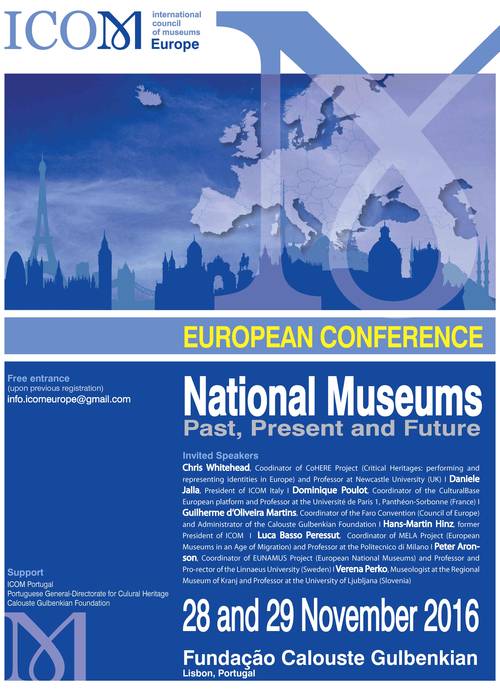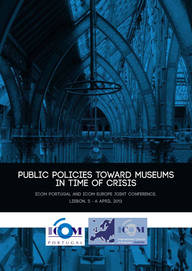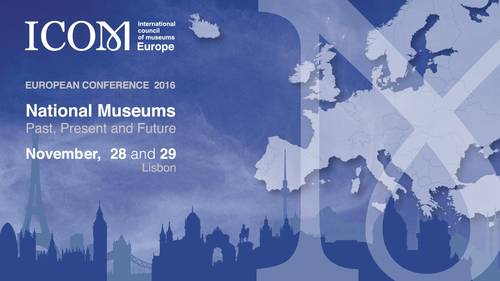Conference Proceedings
ICOM EUROPE CONFERENCE – 2016 – CONCLUSIONS and RECOMMENDATION
The 2016 annual Conference of ICOM Europe on “National Museums. past, present and future”, held in Lisbon, in 28 and 29 November, has revealed to be an important and timely occasion for the overview and critical evaluation of both the conceptual and political dependent questions relating to National Museums, their definition and status, their practical application, and recent evolution in the extremely changeable and largely unpredictable situations currently faced by European countries and regions, as well as nations, peoples and communities. The organizers and participants have to express their most sincere gratitude to all persons and entities involved, with special reference to the Portuguese General-Directorate for Cultural Heritage, the Portuguese National Committee of ICOM and the Calouste Gulbenkian Foundation whose premises and technical supporting facilities were crucial for the unanimously recognized success of the Conference.
ICOM Europe, the Regional Alliance of the International Council of Museums, as the most representative organization of Museums and Professionals of Museums in the entire continent and immediate regions, assembling National Committees from fifty countries (from Atlantic to Urals and Caucasus, from the Arctic Ocean to the Mediterranean) and almost thirty thousand individual and institutional members (representing about four fifths of the total ICOM worldwide membership), is profoundly committed to the promotion of museums in general, developing their missions and social goals, which are, according to the ICOM´s definition, “the service of society and its development… for the purposes of education, study and enjoyment”.
National Museums can be understood in the most restrictive sense of institutions presenting collections and displays aimed to construct narratives documenting (by reinforcing or reinventing) claims and expectations of national values and realities recognition. Alternatively, they can be seen in a wider sense of museums classified administratively as “National” due to the importance of their collections, whether public as private. In both cases, they are essential to the making of museological policies, and pivotal for the (re)consideration of European social representations at all levels – from the immediate perception of the community to a national sense of belonging, and from this to the State proclamation of power. Museums in general, due to their autonomy and direct contact with citizens, are in particular good conditions to explain the indispensability of acknowledging multiple identities for establishing and safeguarding a peaceful world. And this has to be done no only at the national level, as at the regional and local one. When considering the future of national museums, or in fact the common future of nations, states or countries, as discussed and interpreted in national museums, the local, urban and regional identities and cultures cannot be ignored or diminished, since in most cases these are the really immediate perceptions of community building.
In such conditions, the Conference observes that National Museums have their own particular distinctiveness; but they are also submitted to the same fundamental challenges as all other museums, viewed as socially-cultural devices. Devices where there exists the need for enlargement of potential fields of acting (from traditional object-oriented strategies to intangible heritages and territories), openness to the most wide possible segments of publics and effective intervention in the contemporary flow of life, based on the principle that all human past construct has to be critically seen from the present, aiming the forecast of future.
Having all these facets in consideration, and also the inputs given by speakers and interventions in debates, the 2016 annual Conference of ICOM Europe recommends for professionals of museums, museums, museums associations and public administrations, cultural institutions and policies makers in general to take into consideration the following observations:
 1 – The Recommendation of UNESCO on the Protection and Promotion of Museums and Collections, formally adopted by the 38th session of the General Conference on 17 November 2015, shall serve as an immediate orientating document and its implementation shall be attentively observed and reported in order to prepare the interim report preview for 2018. In this regard, ICOM Europe addresses a message to all ICOM European National Committees urging them to cooperate with national governments in order to allow for deeper and best-informed evaluation of the application of this Recommendation in their countries, and also to collect data on the ongoing process, aiming to organize, in due time, a meeting on the subject. In so doing, special attention shall be given to principles relating the key role in society of museums in general and National Museums in particular, observing the situations where they are asked to act as factors for social integration and cohesion, building citizenship and rethinking of collective identities (provisions 16 and 17 of the Recommendation). Attention is also required to questions relating to personnel, planning and funding (provisions 27 and 28), as well as strategic autonomy which has to be considered critical for the accomplishing of their missions, especially at the national level.
1 – The Recommendation of UNESCO on the Protection and Promotion of Museums and Collections, formally adopted by the 38th session of the General Conference on 17 November 2015, shall serve as an immediate orientating document and its implementation shall be attentively observed and reported in order to prepare the interim report preview for 2018. In this regard, ICOM Europe addresses a message to all ICOM European National Committees urging them to cooperate with national governments in order to allow for deeper and best-informed evaluation of the application of this Recommendation in their countries, and also to collect data on the ongoing process, aiming to organize, in due time, a meeting on the subject. In so doing, special attention shall be given to principles relating the key role in society of museums in general and National Museums in particular, observing the situations where they are asked to act as factors for social integration and cohesion, building citizenship and rethinking of collective identities (provisions 16 and 17 of the Recommendation). Attention is also required to questions relating to personnel, planning and funding (provisions 27 and 28), as well as strategic autonomy which has to be considered critical for the accomplishing of their missions, especially at the national level.
2 – The Council of Europe Framework Convention on the Value of Cultural Heritage for Society, commonly known as Faro Convention, initially subscribed in 2005, is also an outstanding reference for museums, full of potential still to be properly developed. The close link between intangible and tangible heritage, collections and territories, as well as the absolute need for community involvement in the promotion of heritage and museologic values, are more than ever required for museums in general and National Museums – in particular due to the sensitive situation they may or are already facing in view of recent societal developments, where ties between communities and territories can be eroded or in any case deeply reshaped.
3 – Relating specifically National Museums, it is the belief of the Conference that the main conclusions derived from the seminal European Project EUNAMUS, European national museums: Identity politics, the uses of the past and the European citizen, and particularly from the report relating National Museums Making History in A Diverse Europe are still valid and have to be addressed continually in the future. This is the case of recommendations relating the need for National Museums to be autonomous creative institutions, to understand and be open about their performances, to overcome national constraints, to develop and share tools for establishing bridge-building narratives, to review their impact on perceptions of citizenship, to reach new audiences, to act in connection with regional and local museums and to act as forums for contested issues. In a continent where univocal state-nations configurations are almost the exception, and extremely diverse situations of ambiguity between these two elements not only still exist today as tend to increase in the near future, National Museums can act, again according to EUNAMUS, as an “Europe’s ‘cultural glue’, contributing to the communal attitudes needed for communities to meet a future of sustainable and inclusive growth”. In these terms, investment in National Museums has to be considered by authorities as a key strategic option and extreme situations of abandon, like the one observed in Sarajevo, regarding the National Museum of Bosnia and Herzegovina, are to be firmly condemned.
4 – The increasing search for enhanced modes of assessment concerning professional and institutional performances are also to be stressed and particular mention was made to inconveniences resulting from the extreme diversity in national systems of museums’ accreditation – a situation which has to be considered contrary to the quest for pan-European standards and final better recognition and development of museums. Aware of the magnitude in any attempt to established common procedures on this complex domain, the Conference expressed the need for cooperative work by ICOM Europe and all National Committees, as well as other relevant associations in reflecting on possible guidelines, to use as technical bases for possible future developments at higher formal levels. These guidelines are considered essential to better prepare recommendations and conventions, within the frame of ICOM and UNESCO, as well as the Council of Europe – and to ideally get the form of governmental agreements.

5 – The important role of international public financed projects for culture and heritage, as the ones of the European Union and the Council of Europe, has been stressed and attentively evaluated with the participation of the coordinators of some of the most influential in recent years and other still in course or being initiated. Museums’ research, mainly university oriented, has developed enormously due the opportunities derived from this frame. Also museums, and National Museums in especial due to their larger capacity to accommodate wide nets of cooperation, took advantage from these projects, which are necessarily to be continued and enlarged, since culture and humanities still are significantly less funded than other social domains including the so-called “fundamental sciences”. However, concerns have been expressed relating the extent to which the important results deriving from European funded projects have been really absorbed by museums, benefiting their everyday life, upgrading their professional standards and ameliorating their social services. These worries were accentuated by the observed “depopulation” or “generation gap” processes undergoing in many museums, all across Europe, making it enormously difficult, if not impossible, for them to act as fully partners, in a mutual fruitful way. This dramatic evolution has to be corrected and closer attention shall be given in the future to the drafting of projects, so that their outcomes are to include as much as possible practical sound results, for museums and their publics.
Finally, the participants have been informed that the next annual Conference of ICOM Europe will be held in Bologna, Italy, at 13-14 November 2017, being organized in close cooperation with ICOM Italy, under the theme “The Role of Local and Regional Museums in the Building of a People’s Europe”.
————————————————————
Recommendation
on the National Museum of Bosnia and Herzegovina, in Sarajevo
Considering that:
-ICOM, the International Council of Museums, the only worldwide organization representing museums and museum professionals, has since 1946 assisted the community of museums in their mission to preserve, conserve and share cultural heritage.
-ICOM Europe, the Regional Alliance of the International Council of Museums, the most representative organization of Museums and Professionals of Museums in the entire continent and immediate regions, assembling National Committees from fifty countries (from Atlantic to Urals and Caucasus, from the Arctic Ocean to the Mediterranean) and almost thirty thousand individual and institutional members (representing about four fifths of the total ICOM worldwide membership), is profoundly committed to the promotion of museums in general, developing their missions and social goals, which are, according to the ICOM´s definition, “the service of society and its development… for the purposes of education, study and enjoyment”.
-The recent annual Conference of ICOM Europe on the theme of “National Museums”, organized in Lisbon, November 28-29, 2016 with the participation of more than one hundred museum professionals from about twenty European countries, decided to underline the need for states authorities to support and develop National Museums, as autonomous heritage institutions promoting citizenship and acting as forums for elaborating contested issues and establishing bridge-building narratives
– The investment in National Museums has to be considered as a key strategic option for the European countries.
-The difficult financial situation of the National Museum of Bosnia and Herzegovina, in Sarajevo, conducted to its closure to the public for several years and its reopening in an extremely still difficult situation.
It is recommended to the competent national and local authorities in Bosnia and Herzegovina to:
– Make all possible efforts to solve the financial problems in order to guarantee the good functioning of the National Museum of Bosnia ans Herzegovina, as well as the continuing of the important work achieved by the museum’s professionals, whose devotion is recognized by the entire community of museum all around the world.
– Strengthen the role of the National Museum as a Europe’s ‘cultural glue’, contributing to the appropriate attitudes helping communities to meet a future of sustainable and inclusive growth.
-Elaborate a strategic plan for the renovation of the National Museum of Bosnia and Herzegovina and the development of its activities in the service of society.
ICOM Europe Board, Lisbon, December, 1, 2016

ICOM EUROPE CONFERENCE – 2016
National Museums
past, present and future
Lisbon, 28 and 29 November 2016
Fundação Calouste Gulbenkian
Key-speakers
Chris Whitehead, Coordinator of CoHERE Project (Critical Heritages: performing and representing identities in Europe) and Professor at Newcastle University (UK)
Daniele Jalla, President of ICOM Italy
Dominique Poulot, Member of the CulturalBase European platform and Professor at the Université de Paris 1, Panthéon-Sorbonne (France)
Guilherme d’Oliveira Martins, Coordinator of the Faro Convention (Council of Europe) and Administrator of the Calouste Gulbenkian Foundation
Hans-Martin Hinz, former ICOM President
Karen Brown, Coordinator of EU-LAC MUSEUMS Project and Head of the Museum, Galleries and Collections Institute, St. Andrews University (Scotland, UK)
Monika Hagedorn-Saupe, Europeana Foundation Governing Board Member
inzHiLuca Basso Peressut, Coordinator of MELA Project (European Museums in an Age of Migration) and Professor at the Politecnico di Milano
Peter Aronsson, Coordinator of EUNAMUS Project (European National Museums) and Professor and Pro-rector of the Linnaeus University (Sweden)
Verena Perko, Curator at the Regional Museum of Kranj and Professor at the University of Ljubljana (Slovenia)
Information / Registration
November, 28
9h30- Opening session.
-José Alberto Ribeiro, Chair of ICOM Portugal
-Luís Raposo, President of ICOM Europe
-Suay Aksoy, President of ICOM
-Paula Silva, Directora-Geral do Património Cultural
10h00- Hans-Martin Hinz: “New National Museums in a globalized world – Still Memory of Nations?”
10h45- (coffee-break)
11h15- Peter Aronson: “National Museums in a Changing Europe”
12h00- Discussion
12h30- (lunch)
14h30- Luca Basso Peressut: “Crossing Borders: Designing European Identities through Museums”
15h15- Verena Vidrih Perko: “National Museums, political regimes and social changes in Eastern Europe: from late XIX century up today”
16h00- Discussion
16h30- (coffee-break)
17h00- National case-studies.
Nina Zdravic Polic, Slovenia: National Museums and national identity sustenance
Teti Hadjinicolau, Greece: Musées Nationaux, culture populaire et identité nationale
Luís Raposo, Portugal: Holistic National Museums and national consciousness
Karen Brown, Scotland: Displaying the Nation: The Case Study of Scotland
Darko Babic, Croatia: A national museum without a nation state, a nation state without a national museum
18h15- Discussion
November, 29
9h30- Guilherme d’Oliveira Martins: “National Museums and the Common Heritage of Europe”
10h15- Chris Whitehead: “National museums and the negotiation of difficult pasts”
11h00- (coffee-break)
11h30- Dominique Poulot: “National Museums: an historic critical perspective”
12h15- Discussion
12h45- (lunch)
14h45- Daniele Jalla: “National Museums’ management models: the Italian example as a pretext for critical evaluation of current European trends”
15h30- Discussion
15h45- (coffee-break)
16h15- Panel with invited coordinators of European Projects. Coordinated by Luís Raposo, President of ICOM Europe
17h15- Debate
18h00- Closing session
-José Alberto Ribeiro, Chair of ICOM Portugal
-Luís Raposo, President of ICOM Europe
-Suay Aksoy, President of ICOM

Public Policies towards museums in time of crisis, ICOM Portugal and ICOM Europe joint conference, Lisbon, 5 – 6 April 2013
